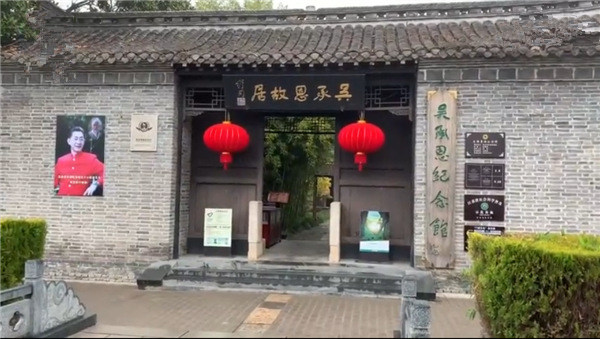Homage is often paid to late authors for their great contributions to the literary world. However, the former residence of Wu Cheng'en in Huai'an, East China's Jiangsu province, has become the center of public online discussion over only a few days.
人们常常对已故作家为文坛做出的巨大贡献表示敬意。然而,位于中国东部江苏省淮安市的吴承恩故居在短短几天内就成为网友热议的话题。
Wu, a Chinese novelist and poet of the Ming Dynasty (1368-1644), is considered to be the author of Journey to the West, one of the Four Great Classical Novels of Chinese literature.
吴承恩,中国明代(1368-1644)的小说家和诗人,是我国四大名著之一《西游记》的作者。
The others are Dream of the Red Chamber, Romance of the Three Kingdoms and Heroes of the Marshes.
其他三大名著分别是《红楼梦》、《三国演义》和《水浒传》。

Yet the interior of his residence, which is now a tourist site, displays more portraits of the TV star Liu Xiao Ling Tong, who played the Monkey King in the TV version of Journey to the West, than the creator of this impressive epic.
吴承恩故居已经成为旅游景点,然而,如今那里到处都展示着电视明星、电视剧《西游记》中孙悟空的扮演者六小龄童的画像,比名著的创作者吴承恩的画像还要多。
Many netizens, especially Sina Weibo users, voiced their strong disapproval against this décor, saying "the 1986 TV adaptation of Journey to the West is just one interpretation of Wu's work."
许多网友,尤其是新浪微博用户,对这种装饰表达了强烈的不满,他们说:“1986年改编的电视剧《西游记》只是对吴承恩作品的一种诠释。”
Some are even so furious, they've posted comments like, "this courtyard should be named as the Liu Xiao Ling Tong residence instead of Wu Cheng'en".
一些人甚至非常愤怒,他们发表评论说,“这里应当更名为六小龄童故居,而不是吴承恩故居”。
This topic has been read 250 million times and discussed 14,000 times on Sina Weibo.
这一话题目前在新浪微博上的点击量已达2.5亿次,讨论1.4万次。












